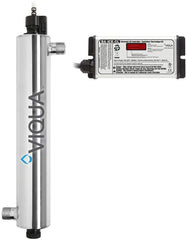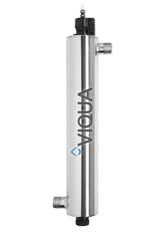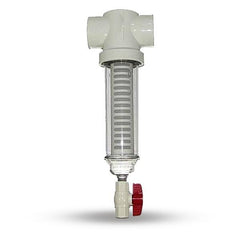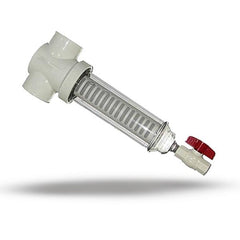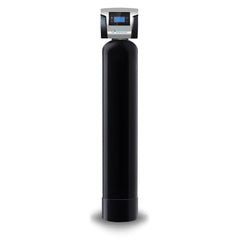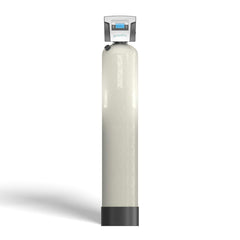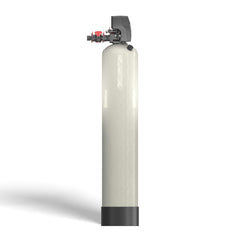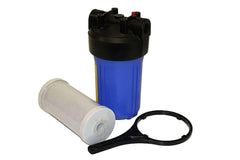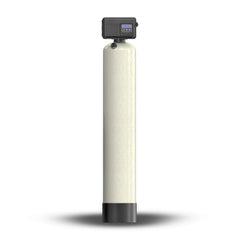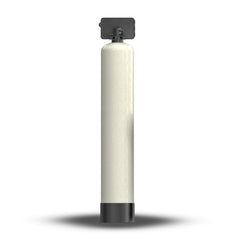Whole home water filter systems operate through a sophisticated filtration process that transforms your entire water supply before it enters your plumbing network. Understanding how these home water filtration systems function requires examining their installation point, filtration mechanisms, and the comprehensive water purification process that delivers clean drinking water to every tap in your residence.
Point-of-Entry Installation & Water Flow
Whole home filtration systems connect directly to your main water supply line at the point where municipal or well water enters your property. This strategic positioning ensures that every gallon of water flowing through your plumbing system undergoes complete filtration before reaching any fixture, appliance, or tap. The system integrates with a bypass valve that maintains pressure while allowing maintenance access without disrupting water service to your home.
The water supply enters the system under normal household pressure, typically ranging from 40-80 PSI, ensuring adequate flow rates throughout your plumbing network. This pressure drives water through multiple filtration stages while maintaining sufficient force to supply upper floors and high-demand appliances like washing machines.
Mechanical Filtration: Removing Physical Contaminants
The initial filtration stage employs mechanical filters that capture visible particles and sediment from your tap water. These pre-filters trap sand, silt, rust, and debris that commonly enter water supply systems through aging infrastructure or natural sources. The mechanical filtration process prevents these particles from causing corrosion in your plumbing system while protecting downstream filtration components from premature clogging.
Rust particles, particularly problematic in areas with older iron pipes, get intercepted before they can create unsightly stain marks in bathroom fixtures or affect water quality. The filtration system captures particles as small as 5-50 microns, depending on the filter media specifications.
Chemical Filtration Through Activated Carbon
Activated carbon serves as the primary chemical filtration medium in whole home water filtration systems. This highly porous material removes chlorine, hydrogen sulfide, pesticides, and volatile organic compounds that affect taste and odor in tap water. The carbon filtration process works through adsorption, where contaminant molecules bind to the carbon surface.
Chlorine removal is particularly crucial since this disinfectant, while necessary for municipal water treatment, can create unpleasant taste and odor while potentially forming harmful byproducts. Hydrogen sulfide, which creates the characteristic "rotten egg" smell, gets effectively eliminated through specialized carbon formulations designed for sulfur compound removal.
Heavy Metal Extraction & Ion Exchange
Advanced filtration stages target dissolved heavy metals including lead, mercury, arsenic, iron, and manganese that pose health risks or cause aesthetic issues. Ion exchange resins selectively remove these metallic contaminants while maintaining beneficial mineral content in your drinking water.
Lead removal is particularly critical in homes with older plumbing systems where this toxic metal can leach into the water supply. Iron and manganese removal prevents metallic taste and stain formation while eliminating the reddish-brown discoloration these metals create in tap water.
Reverse Osmosis Integration
Some whole home water filter systems incorporate reverse osmosis technology for comprehensive water purification. Reverse osmosis membranes remove dissolved solids, bacteria, viruses, and molecular-level contaminants by forcing water through semi-permeable barriers under pressure. This process can remove up to 99% of dissolved contaminants, delivering water quality that exceeds bottled water standards.
Ultraviolet Sterilization
Ultraviolet light systems work by exposing water supply to UV radiation that neutralizes bacteria, viruses, and other microorganisms without adding chemicals to your drinking water. This water purification method ensures biological safety while maintaining the natural taste and odor characteristics of treated water.
Water Softening Integration
Hard water treatment addresses calcium and magnesium mineral content through ion exchange processes integrated into whole home water filtration systems. Water softening prevents scale buildup in plumbing systems, water heaters, and appliances while eliminating the stain formation and soap scum that hard water creates in bathroom fixtures.
The water softening process exchanges hardness minerals for sodium or potassium ions, protecting your plumbing infrastructure from mineral scale corrosion while extending washing machine and dishwasher lifespan.
System Monitoring & Pressure Regulation
Whole home filtration systems incorporate pressure monitoring to ensure consistent water flow throughout your home. Pressure regulators maintain optimal flow rates while preventing filtration media damage from excessive pressure spikes. Monitoring systems track filtration performance and alert homeowners when filter replacement is needed.
Comprehensive Water Quality Delivery
The filtration process delivers treated water to every tap, shower, and appliance in your home, providing consistent water quality for drinking water, cooking, bathing, and cleaning applications. Unlike point-of-use filters, whole home water filtration ensures that contamination removal occurs before water contacts your plumbing system, preventing corrosion and extending infrastructure lifespan.
Filtration effectiveness depends on proper sizing, installation, and maintenance. Professional water solutions providers ensure that filtration capacity matches household demand while maintaining adequate pressure and flow rates throughout the system.
SoftPro whole home water filter systems integrate these filtration technologies into comprehensive water treatment solutions that address multiple contamination sources simultaneously, delivering superior water quality that eliminates the need for bottled water while providing unlimited access to clean, safe water throughout your residence.
Key Components of Whole House Water Filtration Systems
A whole house water filtration system is composed of several essential components that work together to deliver purified water:
Pre-Filter: This component captures larger particles such as sediment and rust, preventing them from clogging or damaging the main filtration system.
Main Filtration Unit: The heart of the system often includes activated carbon filters to remove chlorine and organic compounds or specialized media for heavy metals and other contaminants.
Optional Add-Ons: Depending on your needs, additional components like UV sterilizers can kill bacteria and viruses, while water softeners reduce mineral content to prevent scale buildup.
Post-Filter: This final stage ensures any residual impurities are filtered out before the water reaches your taps.
Each component plays a specific role in ensuring that the water flowing through your home is safe and clean for all purposes.
Whole House Water Filter vs. Point-of-Use System: What’s the Difference in these water filter systems?
Whole house water filters and point-of-use systems serve different purposes based on where and how they are installed. Whole house systems treat all the water entering your home at the main supply line. This means every drop of water—whether used for drinking, bathing, or cleaning—is filtered.
These systems are ideal for households looking for comprehensive protection against contaminants and issues like hard water or sediment buildup in plumbing.
On the other hand, point-of-use systems are designed to filter water at specific locations within your home, such as a kitchen sink or bathroom faucet.
These systems are smaller and more affordable but only provide clean water for limited uses like drinking or cooking. While they are easier to install and maintain, they lack the broad coverage of whole house systems.
Choosing between these options depends on your priorities—whether you need filtered water throughout your entire home or just at specific outlets. Whole house systems offer convenience and comprehensive protection but come with higher upfront costs compared to point-of-use alternatives.




